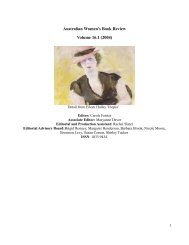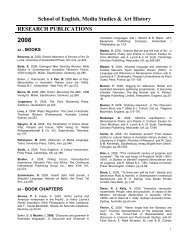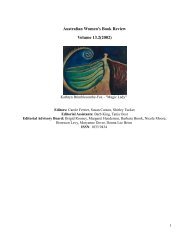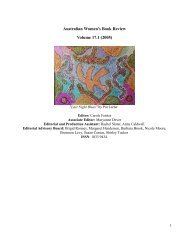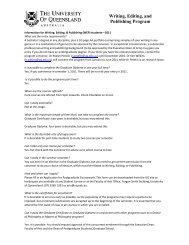Australian Women's Book Review Volume 14.1 - School of English ...
Australian Women's Book Review Volume 14.1 - School of English ...
Australian Women's Book Review Volume 14.1 - School of English ...
Create successful ePaper yourself
Turn your PDF publications into a flip-book with our unique Google optimized e-Paper software.
decade saw the rise <strong>of</strong> the new international order marked by American neo-colonialism and the Green<br />
Revolution, as well as by computerization and electronic information that replaced traditional forms <strong>of</strong><br />
communication. At the same time, the global community could not escape grappling with the 'internal<br />
contradictions and external resistance', to quote Fredric Jameson, inherent in every social structure.<br />
Out <strong>of</strong> the given agenda, Hewett took big visions that subsequently crumbled into nothingness, and<br />
delusions that cost lives. Nowhere, however, is much more than a melodrama. It is an <strong>Australian</strong> story.<br />
The play takes place on a long-forsaken showground at the edge <strong>of</strong> a country town in Western<br />
Australia, Hewett's recurring location. The protagonists are two tramp-like figures from society's<br />
margin who, it is clear, can be expected to have far more to <strong>of</strong>fer than 'boring' (Hewett's own word)<br />
middle-class suburbia. At an advanced age, she still claims that she 'married two rough boys and joined<br />
the Communist Party to join the rough boys and girls'. In Nowhere, though, the author 'changes gender'<br />
and ascribes some <strong>of</strong> her life experiences to a male hero. Josh, 'an eighty year old pensioner, once a<br />
Communist', is portrayed as a former itinerant worker who 'jumped rattlers all over the country in the<br />
depression'. He dwells in a shack that reeks <strong>of</strong> urine and soiled possessions hoarded over twenty years<br />
in which his life was kept at a standstill. With Josh trying hard to pull on his battered boots and the line<br />
'Get on y' bastards, get on' - an unequivocal reference to Godot - the historical framework <strong>of</strong> the play is<br />
established with Hewett positioning herself as a writer at the cross-roads <strong>of</strong> the avant-garde and postmodernism,<br />
where three generations <strong>of</strong> <strong>Australian</strong>s meet. For Nowhere opens with another character's<br />
dream and a clash <strong>of</strong> sentiments that bring forth the sense <strong>of</strong> failure and enduring pain. Snow, 'a<br />
homeless forty eight-year-old Vietnam veteran' is haunted by the memory <strong>of</strong> atrocities he blindfoldedly<br />
committed in somebody else's homeland against people who fought for their own vision <strong>of</strong> a<br />
harmonious society. With just one word, 'democracy', on the swearing lips <strong>of</strong> Snow's commander, the<br />
playwright conjures the full controversy and ethical dilemmas behind foreign interference into the<br />
internal affairs <strong>of</strong> a sovereign country. She deconstructs and ridicules the hollow language <strong>of</strong> war<br />
propaganda and exposes the strategies <strong>of</strong> fear and coercion. The dreaded possibility <strong>of</strong> Japanese<br />
invasion is then juxtaposed with their portrayal as 'our best customers' today. Sarcasm, jokes and irony<br />
are all Josh's; Snow feeds the lines to him and completely conforms with the expressionistic treatment<br />
<strong>of</strong> a supporting character who is a function <strong>of</strong> the protagonist's central subjective standpoint. The<br />
female hero, who completes the triad, does not enter the play before the closing lines <strong>of</strong> the first scene.<br />
In Nowhere, the older man plays the role <strong>of</strong> an eye-opener to his younger and politically naïve mate.<br />
This stereotyped concept <strong>of</strong> character relationships taken over from satirical comedy subverts the<br />
whole notion <strong>of</strong> the dignity <strong>of</strong> war, without confusing an armed conflict driven by imperialistic<br />
interests with an anti-fascist war. Thereby Hewett avoids shutting out dialogue with other currently<br />
circulating discourses, and allows for the possibility <strong>of</strong> alternative ideological positions. The indictment<br />
on the sacrifice <strong>of</strong> human lives, however, is immediate and enduring, since the social position <strong>of</strong> both<br />
characters allows for no ambiguities as to the rewards awaiting the returned soldiers. It is clear that,<br />
through constant revolutionary agitation and subversion, a particular form <strong>of</strong> epistemological and<br />
ideological critique emerges, stemming from Hewett's allegiance to the avant-garde. It produces a form<br />
<strong>of</strong> insight into alternative values and, consequently, into what Richard Murphy, in his 1999 text,<br />
Theorizing the Avant-Garde, calls 'the discursive status <strong>of</strong> reality.' The desired result <strong>of</strong> this technique is<br />
an informed opposition to any dogma or 'fixity' that might emerge and take the central position <strong>of</strong> a<br />
new order. As in many avant-garde texts, Snow's nightmares are close to reality. They are dispersed,<br />
and bickering sentiments between the two men appeased, only with the arrival <strong>of</strong> Vonnie, a young<br />
woman and Aboriginal at that. Hewett ascribes a conciliatory role to the woman in the men's world, and<br />
along with it introduces the theme <strong>of</strong> reconciliation between white and indigenous communities in<br />
37



